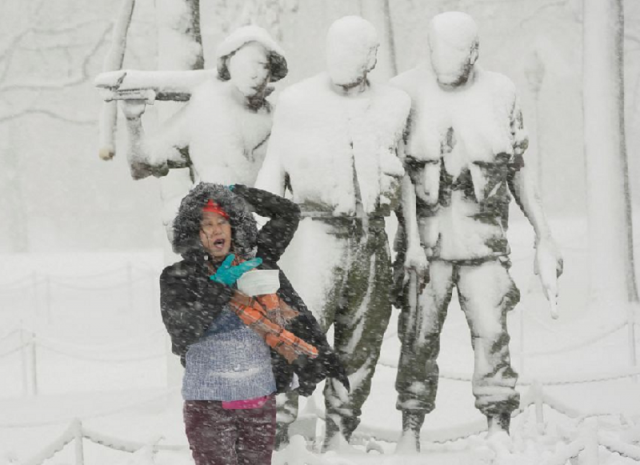Millions brace for snow as storm bears down on US
Weather service says system will produce thunderstorms, snow and freezing rain

Millions of Americans were braced for heavy snow and freezing rain on Sunday as a major winter storm closed in on the eastern United States, knocking power out to an estimated 200,000 people and counting.
The "strong storm over the Southeast/Southern Appalachians will move north-eastward inland from the coast to South-eastern Canada by Tuesday," the National Weather Service said on its website.
"The system will produce rain, thunderstorms, snow, and rain/freezing rain from the Lower Mississippi Valley to the Southeast/southern Mid-Atlantic, Sunday," with more damage predicted for Monday, it continued.
Drivers were warned of "hazardous road conditions" and major travel headaches from Arkansas all the way up to the north-eastern state of Maine.
More than 80 million people fell under the winter weather alerts, US media reported.
About 200,000 customers had already lost power in the southeast, including over 100,000 in Georgia alone, according to the website PowerOutage.US.
Governor Brian Kemp had declared a state of emergency on Friday, and snowplows were at work before noon to clear the roads.
Virginia and North Carolina have also declared a state of emergency. The Weather Channel reported that more than a foot of snow had fallen in North Carolina Sunday morning.
Florida was indirectly affected when several tornadoes caused by the winter storm damaged property in the southern state, according to the Weather Channel.
The NWS even reported some snow flurries in Pensacola, Florida, while social media users in usually-mild Atlanta, Georgia also reported seeing snow.
The storm is also predicted to cause some coastal flooding, with the NWS warning that winds could near hurricane force on the Atlantic coast.
The northeastern United States had already seen snow chaos in early January, when a storm blanketed the Northeast.
After that storm hundreds of motorists were stuck for more than 24 hours on a major highway linking to the capital Washington.



















COMMENTS
Comments are moderated and generally will be posted if they are on-topic and not abusive.
For more information, please see our Comments FAQ